This article needs additional citations for verification .(November 2021) |

Parthenon: Rise of the Aegean is a historical board game.
This article needs additional citations for verification .(November 2021) |

Parthenon: Rise of the Aegean is a historical board game.
Parthenon simulates commerce in the Aegean Sea around 600 B.C. 3–6 players begin with control of two villages and a fleet of ships on an island within the Aegean. Each player develops their island through trade, adding villages and structures. A game represents three years of time, and each year is divided into four seasons of ten phases. The winner is the first to complete all structures.
The game is published by Siren Bridge Publishing and Z-Man Games, Inc. It was designed by Andrew Parks and Jason Hawkins.
Parthenon: Rise of the Aegean won "Board Game of the Year" during the 32nd annual Origins Award. [1]
Components include a game board, 6 reference cards, 18 counters and 440 cards.

Illuminati: New World Order (INWO) is an out-of-print collectible card game (CCG) that was released in 1994 by Steve Jackson Games, based on their original boxed game Illuminati, which in turn was inspired by the 1975 book The Illuminatus! Trilogy by Robert Anton Wilson and Robert Shea. An OMNI sealed-deck league patterned after the Atlas Games model was also developed.

Magic: The Gathering is a tabletop and digital collectible card game created by Richard Garfield. Released in 1993 by Wizards of the Coast, Magic was the first trading card game and had approximately thirty-five million players as of December 2018, and over twenty billion Magic cards were produced in the period from 2008 to 2016, during which time it grew in popularity.
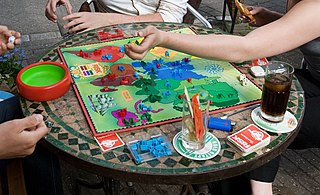
Risk is a strategy board game of diplomacy, conflict and conquest for two to six players. The standard version is played on a board depicting a political map of the world, divided into forty-two territories, which are grouped into six continents. Turns rotate among players who control armies of playing pieces with which they attempt to capture territories from other players, with results determined by dice rolls. Players may form and dissolve alliances during the course of the game. The goal of the game is to occupy every territory on the board and, in doing so, eliminate the other players. The game can be lengthy, requiring several hours to multiple days to finish. European versions are structured so that each player has a limited "secret mission" objective that shortens the game.

Civilization is a board game designed by Francis Tresham, published in the United Kingdom in 1980 by Hartland Trefoil, and in the US in 1981 by Avalon Hill. The Civilization brand is now owned by Hasbro. It was out of print for many years, before Gibsons Games republished it in 2018.
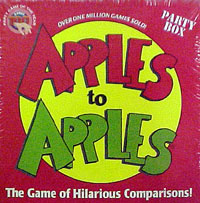
Apples to Apples is a party game originally published by Out of the Box Publishing Inc., and now by Mattel. Players start with a hand of seven "red apple" cards, which feature nouns. A player is selected to be the first judge, and that judge plays a "green apple" card, which features an adjective. The round is won by playing the "red apple" card that the judge determines to be the best match for the "green apple" card. The role of the judge rotates, and the number of rounds is determined by the number of players. The game is designed for four to ten players and played for 30–75 minutes.
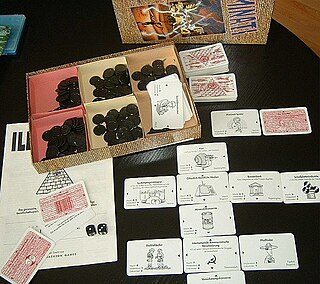
Illuminati is a card game made by Steve Jackson Games (SJG), inspired by the 1975 book, The Illuminatus! Trilogy, by Robert Anton Wilson and Robert Shea. The game has ominous secret societies competing with each other to control the world through various means, including legal, illegal, and even mystical. It was designed as a "tongue-in-cheek rather than serious" take on conspiracy theories. It contains groups named similarly to real world organizations, such as the Society for Creative Anachronism and the Symbionese Liberation Army. It can be played by two to eight players. Depending on the number of players, a game can take between one and six hours.
Risk 2210 A.D. is a 2–5 player board game by Avalon Hill that is a futuristic variant of the classic board game Risk. Risk 2210 A.D. was designed by Rob Daviau and Craig Van Ness and first released in 2001. In 2002, it won the Origins Award for "Best Science Fiction or Fantasy Board Game of 2001".

Ticket to Ride is a railway-themed German-style board game designed by Alan R. Moon. It was illustrated by Julien Delval and Cyrille Daujean and published in 2004 by Days of Wonder. The game is also known as Zug um Zug (German), Les Aventuriers du Rail (French), Aventureros al Tren (Spanish), Wsiąść do pociągu (Polish), and Menolippu (Finnish).
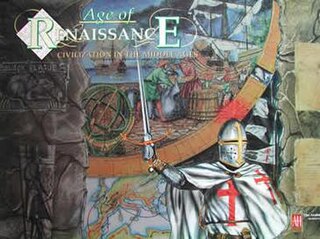
Age of Renaissance is a board game designed by Don Greenwood and Jared Scarborough and published by Avalon Hill in 1996. The game is for 3-6 players and the box claims that the game should take 2-6 hours to play, though as with any serious multiplayer strategy game, this can entirely depend on the players. Age of Renaissance is set in the European Renaissance historical era and is somewhat of a sequel to Civilization. In 1997, Age of Renaissance won the Origins Award for Best Pre-20th Century Board Game of 1996.
History of the World is a board game designed by Ragnar Brothers and originally published in 1991. It is played by up to six players in seven epochs, each player playing a different empire in each epoch.

Kremlin is a board game satire of power struggles within the pre-glasnost Soviet Union government of the 1980s. The game takes its name from the Kremlin in Moscow, the location associated with the central Soviet government offices. The original German-language edition was designed by Urs Hostettler and released in 1986 by the Swiss board game company Fata Morgana Spiele under the name Kreml. An English translation of the game with slightly modified rules was published by Avalon Hill in 1988. Kremlin won a 1988 Origins Award for Best Boardgame Covering the Period 1900-1946.
This page lists board and card games, wargames, miniatures games, and tabletop role-playing games published in 2005. For video games, see 2005 in video gaming.

Pandemic is a cooperative board game designed by Matt Leacock and first published by Z-Man Games in the United States in 2008. Pandemic is based on the premise that four diseases have broken out in the world, each threatening to wipe out a region. The game accommodates two to four players, each playing one of seven possible roles: dispatcher, medic, scientist, researcher, operations expert, contingency planner, or quarantine specialist. Through the combined effort of all the players, the goal is to discover all four cures before any of several game-losing conditions are reached.
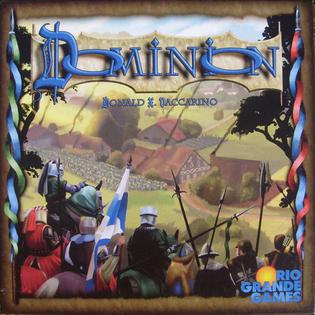
Dominion is a deck-building game created by Donald X. Vaccarino and published by Rio Grande Games. It was the first game of its kind, and inspired a genre of games building on its central mechanic. Each player begins with a small deck of cards, which they improve by purchasing cards from a common supply that varies from game to game. Cards can help the player's deck function, impede their opponents, or provide Victory Points.

RoboRally is a board game for 2–8 players published by Wizards of the Coast (WotC) in 1994. Various expansions and revisions have been published by both WotC and by Avalon Hill.

7 Wonders is a board game created by Antoine Bauza in 2010 and originally published by Repos Production in Belgium. 7 Wonders is a card drafting game that is played using three decks of cards featuring depictions of ancient civilizations, military conflicts, and commercial activity. The game is highly regarded, being one of the highest rated games on the board game discussion website BoardGameGeek. 7 Wonders has won more than 30 gaming awards, including the inaugural Kennerspiel des Jahres connoisseurs' award in 2011. The game has been cited by leading designers as one of the most influential board games of the last decade.

Catan, previously known as The Settlers of Catan or simply Settlers, is a multiplayer board game designed by Klaus Teuber. It was first published in 1995 in Germany by Franckh-Kosmos Verlag (Kosmos) as Die Siedler von Catan. Players take on the roles of settlers, each attempting to build and develop holdings while trading and acquiring resources. Players gain victory points as their settlements grow; the first to reach a set number of victory points, typically 10, wins. The game and its many expansions are also published by Catan Studio, Filosofia, GP, Inc., 999 Games, Κάισσα, and Devir.

Freedom: The Underground Railroad is a 2013 co-operative board game designed by Brian Mayer and published by Academy Games, their first game in the Freedom Series. The game has drawn positive attention for its approach and handling of the topic.
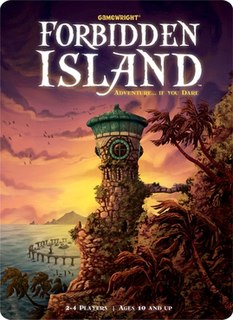
Forbidden Island is a cooperative board game developed by Matt Leacock and published by Gamewright Games in 2010. Two to four players take the roles of different adventurers, moving around a mysterious island, looking for hidden treasures as the island sinks around them. All players win if they find all the hidden treasures and they all make it back to the helicopter and fly away, and they all lose if they cannot.

Codenames is a 2015 card game for 4–8 players designed by Vlaada Chvátil and published by Czech Games Edition. Two teams compete by each having a "spymaster" give one-word clues that can point to multiple words on the board. The other players on the team attempt to guess their team's words while avoiding the words of the other team. In a variant with 2–3 players, one spymaster gives clues to the other player or players.